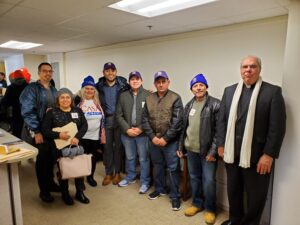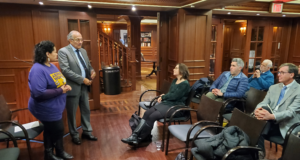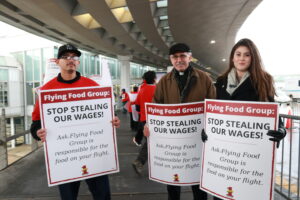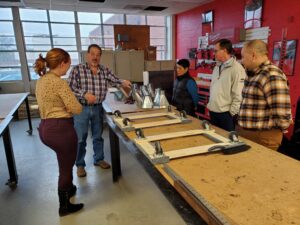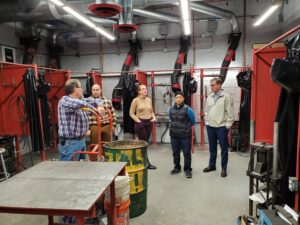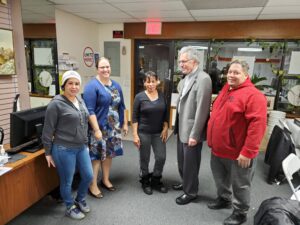The Working Catholic: Exhibit about Workers
by Bill Droel
Museum of the City of New York (1220 Fifth St., New York, NY 10029) just ended an exhibit about the history of workers in its city. It’s not too late, however, to enjoy the exhibit. It is the basis for City of Workers, City of Struggle edited by Joshua Freeman (Museum of City of NY, 2019; $40). Our Chicago Public Library has a copy, as do other libraries.
The book’s introduction notes that working people help define politics, culture and the public sphere. In struggles between employees and employers, in struggles among groups of workers and in struggles within unions, people determine “what makes a good and livable city.” The book is about labor movements (plural), the introduction explains. That’s because the marketplace is fluid with new labor sectors replacing the old, with new immigrant groups arriving with new skills, with new wage arrangements and more. The book’s contributors devote chapters to colonial New York, slave labor, housework, sailors and dockhands, garment workers, labor relations and race, Puerto Rican contributions, civil servants and others. The book is richly illustrated with old pictures, news articles, posters and the like. A recurring theme is the rise, fall and renewal of several unions. There are more union workers in New York City, by the way, than anywhere else in our country.
Any story about New York City, particularly a story about workers, must treat the fire of March 1911 in the Asch Building (now known as Brown Building, owned by N.Y. University). Within 18 minutes, 144 workers at the Triangle Shirtwaist Factory were dead and two more died subsequently. It happened that Frances Perkins (1880-1965) was in a nearby café. She witnessed the horror. If you have ever drawn overtime pay, ever collected an unemployment check, ever benefited from Social Security, ever been thankful for safety features at your job site, it is because of the tireless efforts of Perkins—first with the Consumers League, then as a New York State official and finally as the first woman cabinet member, serving as Secretary of Labor through all of President Franklin Roosevelt’s (1882-1945) terms. She often said that the imprint of the Triangle Company tragedy compelled her to improve conditions for working families.
City of Workers, City of Struggle details how the CIO grew during the late 1930s in New York City, borrowing the sit down tactic from John L Lewis (1880-1969). The tactic was effective at a public transportation powerhouse, at Woolworths and other dry goods stores and more. Although the CIO is associated with steel in Pittsburgh and automobiles in Detroit, many CIO unions had their national headquarters in New York City.
The book’s chapter on health care features Local 1199, a union for which I briefly worked in the early 1970s. Led by Leon Davis (1905-1992), this union began among pharmacists and other drugstore workers. Davis hired Elliott Godoff (1905-1975) to organize hospital workers. For 40 years after the National Labor Relations Act (aka the Wagner Act) voluntary hospitals remained outside of labor relations jurisdiction. Also many nurses felt that as professionals they did not need a union. And, concerns about public safety limit a union’s tactics in a hospital setting. Nonetheless in December 1958 a Bronx hospital recognized Local 1199 as “sole and exclusive bargaining agent” for its workers. There were lots of ups and downs for Local 1199 and other health care unions for several years. At critical moments, Cardinal John O’Connor (1920-2000) assisted the union with dramatic testimony and action. In 1995 an on-again-off-again merger between Local 1199 and Service Employees International was ratified.
Near its conclusion, City of Workers, City of Struggle considers the new worker centers. These centers do not engage in collective bargaining. They are a combination of social service and successful advocacy for workers.
Domestic workers have since 1938 been excluded from federal labor standards, though recently some federal policies have been extended to “direct care workers.” The remarkable Ai-Jen Poo is U.S. born of Taiwanese heritage. As a college student, Poo volunteered with an Asian-American service agency. Still in her 20s, she began systematic visits to many New York City playgrounds where she built relationships with nannies and other care workers who frequented the parks. She organized small meetings and by 2002 her groups were pressuring city entities for improved oversight of their occupation. In 2007 she launched National Domestic Workers Alliance (www.domesticworkers.org). NDWA successfully lobbied for labor standards that exceed federal minimums in nine states and in Seattle. NDWA is now pushing for a National Domestic Workers Bill of Rights to include paid overtime, safe working conditions, meal and rest breaks, earned sick time and fair scheduling.
Bhairavi Desal is another remarkable woman who has spent years visiting garages and airport lots talking with taxi drivers. Her Taxi Workers Alliance (www.nytwa.org) lobbies for precarious workers. Fekkak Mamdouh, a leader with Restaurant Opportunities Center (www.rocunited.org), does the same with food service workers. In particular, ROC campaigns to end harassment, to improve scheduling and to establish a fair wage structure. These centers must rely on public attention gained through rallies, education materials, and individual meetings with decision makers.
City of Workers, City of Struggle is a history book. But it is inspiring. It reminds the reader that although there are setbacks, social improvement is possible. The essential ingredients are always dedicated people and focused action over many years.
Droel edits a print newsletter on faith and work, INITIATIVES (P O Box 291102, Chicago, IL 60629)
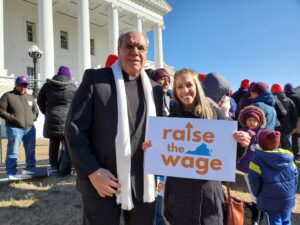 On January 21, several labor unions representing workers in low-wage occupations – notably Northern Virginia’s SEIU Local 32BJ, representing janitors, and UNITE HERE Local 25, representing hotel workers – organized busloads of union workers to travel to the state capital in Richmond to visit their legislators. Accompanying them was Father Bob Cilinski, Chair of the Arlington Diocese Peace and Justice Commission and Pastor of Nativity Church in Burke. It didn’t hurt that Fr. Bob’s parish is located in the district represented by Assembly Speaker Eileen Filler-Corn, who was very interested in what Catholic Social Teaching had to offer on the issue! The day ended with a “Raise the Wage” rally where Fr. Bob offered a prayer and Rachel Laustrup of the Diocese of Richmond Office of Social Ministries, joined the group. Read more
On January 21, several labor unions representing workers in low-wage occupations – notably Northern Virginia’s SEIU Local 32BJ, representing janitors, and UNITE HERE Local 25, representing hotel workers – organized busloads of union workers to travel to the state capital in Richmond to visit their legislators. Accompanying them was Father Bob Cilinski, Chair of the Arlington Diocese Peace and Justice Commission and Pastor of Nativity Church in Burke. It didn’t hurt that Fr. Bob’s parish is located in the district represented by Assembly Speaker Eileen Filler-Corn, who was very interested in what Catholic Social Teaching had to offer on the issue! The day ended with a “Raise the Wage” rally where Fr. Bob offered a prayer and Rachel Laustrup of the Diocese of Richmond Office of Social Ministries, joined the group. Read more
